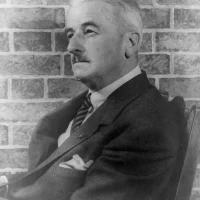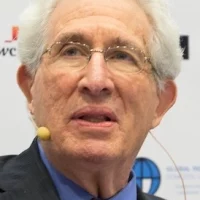President Putin once welcomed USAID’s assistance (at least for a time). Carol Peasley served as USAID’s mission director in Moscow from 1999-2003. This tumultuous period witnessed the fall of Boris Yeltsin and the emergence of Vladimir Putin as a tough-minded leader frequently at odds with the United States. But it was not always that way. Peasley… Read More "When a Newly-Elected President Putin Welcomed USAID’s Advice"
Russian Interference and the Marshall Plan
Russian Disinformation is Not New, Say Diplomats Who Implemented the Marshall Plan The obstacles the United States faced in implementing the Marshall Plan in the late 1940s and early 1950s included a vigorous propaganda contest with the USSR and their European communist allies. By the time Secretary of State George Marshall announced the plan at… Read More "Russian Interference and the Marshall Plan"
William Faulkner, among the most decorated writers in American literature with the 1949 Nobel Prize for Literature, the Pulitzer Prize for Fiction and the National Book Award among his honors, was invited to Japan in 1955 under the auspices of the Exchange of Persons Branch of the United States Information Service (now consolidated into the… Read More "Sound, Fury, Brilliance & Booze: Faulkner in Post-War Japan"
Edward Elson: Entrepreneurial Ambassador to Denmark
The fall of the Soviet Union upset long-established power dynamics, leaving East and Central Europe, in particular, in uncharted waters. The creation of the Nordic-Baltic Eight (NB8), a regional cooperation consisting of Denmark, Estonia, Finland, Iceland, Latvia, Lithuania, Norway, and Sweden, helped the Baltics transition away from Cold War-style self-identification toward a more regionally-focused identity.…
The Afghan Revolution of 1978: Invitation to Invasion
Afghanistan has had a long history of living under foreign rule. Once a protectorate of the British Empire, Afghanistan became fully independent in 1919, but its vulnerable monarchy led by King Zahir Shah was unable to unite the country’s many ancestral tribes into a central government. This set up the conditions for internal political instability. The monarchy… Read More " The Afghan Revolution of 1978: Invitation to Invasion"
To be Young, Rich and Ambassador to Paris in the ’50s
C. Douglas Dillon was a politician and diplomat who served as U.S. Ambassador to France in the critical post World War II period, 1953-1957, and later as Under Secretary of State and Treasury Secretary. Son of a wealthy investment banker, Dillon graduated from Groton and Harvard, served in the U.S. Navy during World War II,… Read More "To be Young, Rich and Ambassador to Paris in the ’50s"
CNN, Tanks, and Glass Walls: The August 1991 Coup
In August of 1991, hard-liners opposed to Soviet President Mikhail Gorbachev initiated a coup attempt to overthrow him. The rebellion occurred in part because of financial strife as the Soviet Union transformed quickly from a statist to a market-based economy. Long lines formed for essential goods including medicine and fuel, and grocery shelves were empty.… Read More "CNN, Tanks, and Glass Walls: The August 1991 Coup"
The Rough Road to Moscow for Malcolm Toon
Malcolm Toon was a fluent Russian speaker and one of the State Department’s top experts on the Soviet Union during the Cold War. He was ambassador to Czechoslovakia, Yugoslavia, Israel, and the Soviet Union. Toon was characterized in The New York Times in 1978 as “one of the most influential of the postwar ambassadors in… Read More "The Rough Road to Moscow for Malcolm Toon "
China scholar Richard Solomon, who was an essential component of the “ping-pong diplomacy” that led to the thaw in relations between the United States and China, was born in Philadelphia, Pennsylvania. After getting a doctorate from the Massachusetts Institute of Technology in 1966, Solomon taught political science at the University of Michigan. He left in…
Warming to the New Administration at the State Department, 1980-1981
Administration transitions, during which power over the federal executive branch is transferred from the sitting president to the president-elect, can be stressful for federal personnel. During the weeks between Election Day and inauguration day, there can be changes in policy, staff and budgets, and the new administration needs to learn about the work of the… Read More "Warming to the New Administration at the State Department, 1980-1981"


